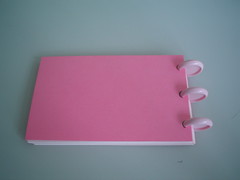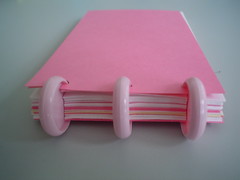First, let me say that I love David Allen's Getting Things Done (GTD). I've read the book a couple of times, and I love reading about people's systems and trying new tools for achieving stress-free productivity. But the truth is, ever since that first GTD seminar I went through, I've had the nagging feeling that I haven't been "doing GTD" correctly.
(GTD). I've read the book a couple of times, and I love reading about people's systems and trying new tools for achieving stress-free productivity. But the truth is, ever since that first GTD seminar I went through, I've had the nagging feeling that I haven't been "doing GTD" correctly.
Over the past year or so, I've tried all sorts of different systems and tools. I've used paper schemes like index cards and Moleskines. I've used Web sites like Vitalist. I've implemented a GTD system in Gmail. I've switched between paper and electronic schemes numerous times. In the end, each of these systems has been abandoned for one reason or another.
So I decided to take a look at what has worked for me and what hasn't, and to stop worrying about "doing GTD" correctly. I thought I'd outline my hybrid system here for your comment and amusement. I admit that I might not be using this system two weeks from now, but for today these are the elements that have withstood the test of time.
First, I follow the two-minute rule: If you can do something in two minutes or less, just do it. Don't write it down unless you can't do it right now (if you're in the car for example). This is a great habit that keeps you from having little jobs pile up.
Second, I have an inbox at home and at work, and I keep my email inbox clear. Gmail makes this especially easy with its "archive" feature. I look at each email and decide if there's something I need to do. If there is, I add it to my to do list. If not, but there's information in the email that might be useful later, I archive it. Google's spectacular search technology makes it easy to retrieve later.
Third, I track all meetings, tasks, and other "open loops" on HiTask, which gives you several ways of tracking different kinds of information, from tasks, to projects, birthdays, to appointments. Best of all, you can use "reminders" for things that aren't exactly tasks or meetings. I use reminders for things I'm waiting for or ideas that are floating around that I want to remember. With HiTask, you can organize your tasks, reminders, and meetings into projects. You can keep notes. You can mark reminders and appointments as completed, just like tasks. And it all works beautifully.
Fourth, I break down my work into smaller tasks. I think this is the single most important lesson of GTD. If you find that you're procrastinating about something, just break it down into smaller and smaller tasks. If you need to write a report, for example, don't just put "write report" on your list. Try "write first paragraph of report" or "think about first paragraph of report." Just find somewhere to start. Being able to cross something off your list will give you momentum and help you move forward.
Finally, I write everything down. I carry a Circa/Rolla notebook with me everywhere so that I can capture notes and ideas on the go. When I get back to the computer I go through my notes for things I need to add to HiTask. I also have a couple of journals that I keep on Google Documents. I use the journals to think through things and plan. I also write in my notebook by hand depending on my mood.
After using other organizational systems ranging from Daytimer to index cards, I feel like the Circa/Rolla system, which allows you to easily move pages around and create new personalized notebooks, is the best solution for me. The key to my organizational system is writing things down, and I love this flexibility.
So what part of GTD don't I do? For one, I don't have a formal weekly review or processing time. I just write things down throughout the day and process when I have a moment.
I also don't have a specific list of projects that I keep up to date. Sometimes I write down all the things going on in my life or job just so that I can see if I'm covering everything, but I don't do it regularly. Neither do I link actions specifically to projects.
I don't use contexts. I've never found them useful, since I spend the majority of my time sitting in front of my computer. I do distinguish between work and personal in HiTask, but I don't feel like it's helpful for me to keep a separate list of phone calls for example. When was the last time I was without a phone?
Basically, I've found that I just don't do well with following systems and routines. I do well with writing stuff down and keeping a big list of things I need to do. The main thing I've gotten out of GTD is the idea of "widgetizing" my work into smaller, simpler tasks. This is the area I want to work on most, and I often use my journals to think through tasks and ideas to make them actionable.
The other big idea I've gotten from GTD is the value of thinking ahead. By taking the time to write about what I'm doing, and look at the big picture, I can be more strategic and achieve things that are actually useful. I used to just do things as they came up. Now I actually plan. Instead of saying to myself, at 6pm, "what are we going to have for dinner?" I spend Saturday morning thinking about what we're going to eat that week. On the weekends I shop for everything I need, so I don't have to stop at the store on the way home from work. Simple things like that have made my life significantly more stress-free.



